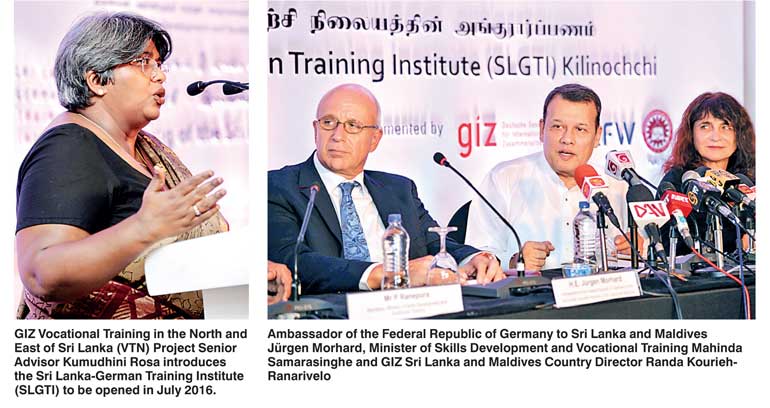Sunday Feb 22, 2026
Sunday Feb 22, 2026
Thursday, 23 June 2016 00:00 - - {{hitsCtrl.values.hits}}

GIZ VTN Project Senior Advisor Kumudhini Rosa at the podium. P. Ranepura (Secretary, Ministry of Skills Development and Vocational Training), Ambassador of the Federal Republic of Germany to Sri Lanka and Maldives Jürgen Morhard, Minister of Skills Development and Vocational Training Mahinda Samarasinghe, GIZ Sri Lanka and Maldives Country Director Randa Kourieh-Ranarivelo and National Apprentice and Industrial Authority Chairman Dr. A. U. C. Athukorala at the head table

The establishment of the Sri Lanka-German Training Institute (SLGTI), a landmark project initiated by German Development Cooperation (GIZ) in partnership with the Government of Sri Lanka, was announced at a press conference attended by Minister of Skills Development and Vocational Training Mahinda Samarasinghe and Ambassador of the Federal Republic of Germany to Sri Lanka and the Maldives Dr. Juergen Morhard. The SLGTI, situated in Kilinochchi, is scheduled to be officially opened on 18 July by President Maithripala Sirisena.
SLGTI is part of the Vocational Training in the North and East of Sri Lanka (VTN) project implemented by Deutsche Gesellschaft für Internationale Zusammenarbeit (GIZ) GmbH and the Kreditanstalt für Wiederaufbau (German Development Bank- KfW) on behalf of the German Federal Ministry for Economic Cooperation and Development (BMZ). The project is co-funded by the State Secretary for Migration of the Government of Switzerland. The VTN project was initiated in 2012 with the goal of improving demand oriented vocational training in the North and East of Sri Lanka.
SLGTI will function under the purview of the National Apprentice Industrial and Training Authority of Sri Lanka (NAITA). It is recognised as a national level training institute with equity of access for all citizens of Sri Lanka, regardless of ethnicity or religion. The centre as a common meeting point will facilitate the development of a mutual understanding and appreciation among students about the diverse cultural heritage of Sri Lanka.
The institute will offer high quality vocational training in sectors of automobile technology, construction technology, food processing technology, mechanical engineering and electrical and electronic technology. The medium of instruction will be English.
“These sectors have been identified for the opportunities available within them for well trained, skilled labour,” said Samarasinghe. “We are confident that SLGTI will provide the best opportunity for war affected youth in the northern and eastern regions of Sri Lanka as well as youth from other parts of the island to develop and enhance valuable industry-specific knowledge and market oriented skills. This will significantly improve their chances in a competitive job market.”
The training for an annual intake of 200 students will be provided at NVQ Levels 4 to 6 in keeping with the National Vocational Qualification (NVQ) framework. To prepare students for this, 14 vocational training centres offering NVQ Levels 1-3 training have been identified as satellite centres in the Northern and Eastern provinces. These satellite centres have been upgraded to meet the standards set by SLGTI.
SLGTI will also cater to young people with G.C.E. O/L, G.C.E. A/L, and NVQ Level 3 and 4 qualifications. The institute’s training staff was supervised in the Training of Trainers (ToT) process by German Consultants; an initial batch of 22 trainers completed the ToT programme in June 2016. During the first years of operation an experienced German Principal will ensure the transfer of international best practices to the operation and administration of the institute.
The state of the art SLGTI facility in Kilinochchi is built on 25 acres of land allocated by the Sri Lankan Government. 8.4 million Euros was allocated through the KfW (German Development Bank) for construction, supply of equipment, machines and teaching materials. The German Federal Ministry for Economic Cooperation and Development (BMZ) has granted an additional 8 million Euros for technical assistance through GIZ. GIZ, in turn, has taken on the task of providing technical assistance, capacity development of qualified managerial staff, and trainers.
At the launch Ambassador of the Federal Republic of Germany to Sri Lanka and the Maldives, HE Dr. Juergen Morhard noted that the opening of SLGTI was a step forward in strengthening the bilateral relations between Sri Lanka and Germany via committed and continued investment in the country’s development process.
“The GIZ has consistently expressed interest in improving vocational training in Sri Lanka,” added Randa Kourieh-Ranarivelo, Country Director for GIZ in Sri Lanka. “Over the years we’ve established a good rapport with the Sri Lankan government in providing technical and vocational training to help young people do better; SLGTI is a significant result of this effort.”
For over 50 years GIZ has provided services worldwide in the field of international cooperation for sustainable development, utilising experience in a wide variety of areas including economic development and employment, energy and the environment, and peace and security. GIZ services are utilised by the German government, governments of other countries and a number of global institutions including the European Union and the United Nations. In 2014 GIZ’s business volume exceeded two billion euros, with the presence of GIZ personnel in over 130 countries around the world. GIZ has been active in Sri Lanka since 1956, engaging in the sectors of education, social integration, private sector development and vocational training.
Sri Lanka and Germany share a rich history of cooperation in skills development spanning over five decades. Beginning with the establishment of the Ceylon German Technical Training Institute (CGTTI), the Apprentice Training Institute (ATI), the Sri Lanka German Railway Training Institute (SLGRTTI) and the Farm Mechanisation Training Centre (FMTC), to introducing the dual system and standardising training programmes, Germany continues to play a prominent role in Sri Lanka’s vocational training sector. Currently, Germany is one of the most important donor and technical partner for vocational training in the country.